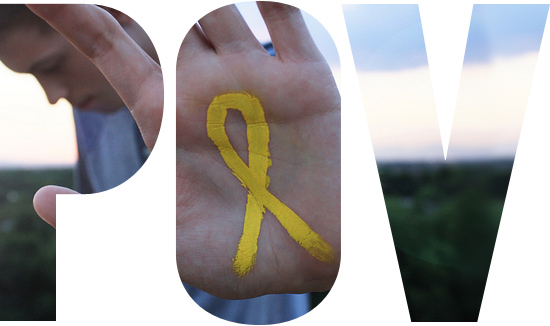POV: We Need to Talk More about Suicide
Slow progress on removing mental health stigma

Photo courtesy of Flickr contributor Jared Keener
Have we reached a tipping point in global mental health?
In light of the suicides of two teenagers in Newton, Mass., last month and other recent events, it’s time to take a look at mental health stigma. Malcolm Gladwell’s The Tipping Point defines the titular term as “that magic moment when an idea, trend, or social behavior crosses a threshold, tips, and spreads like wildfire.” Have we as a society reached the tipping point in our behavior toward people with mental illness or in our ability to talk openly about suicide? Cancer and HIV/AIDS are two health issues that have reached their tipping point, but mental health still has a ways to go.
Many mental health and suicide prevention advocacy groups are doing great programming and are establishing their presence on college campuses around the country, including at BU. Active Minds is a four-year-old student-run organization devoted to increasing awareness of mental health issues, reducing the stigma of such issues, and directing students to behavioral health resources on campus.
Rosie Bauder (CAS’15) and Swanson Ninan (CAS’15) joined together to bring the Out of the Darkness Walk to campus in 2012 and 2013. Out of the Darkness became a student organization this semester and members are planning on doing the Out of the Darkness Walk again in 2014. Their mission is to raise awareness of suicide education and prevention, while reducing the stigma associated with mental illness and suicide.
My life has been profoundly impacted by suicide. In 1981, when I was only 14, I lost my Uncle Tony, and 25 years later, almost to the day, my Uncle Mike. I helped bring the American Foundation for Suicide Prevention International Survivors of Suicide Day observance to campus in 2012; on Saturday, November 23, we observe it again, at BU and in 300 cities around the world. (Find information on BU’s observance here.) Last year, I shared my survivor story publicly for the first time on BU Today, and it seemed people didn’t know what to say to me, so they didn’t say anything.
I realize it’s not a happy topic to bring up, but my hope is that these types of groups and programming will help push us to the tipping point so people will know how to talk to someone about suicide. More people need to share their personal stories. We can see signs of progress:
- In June, the White House held a Conference on Mental Health, its first such conference in 12 years, according to doctor and filmmaker Delaney Ruston, whose documentary Hidden Pictures explores mental health care around the world. She says President Obama is specifically looking to hear college students’ personal stories about their mental health struggles. A 2012 National Alliance on Mental Illness survey of college students who were diagnosed with a mental health condition in the previous five years found that 64 percent withdrew from college because of their condition.
- Last month, the World Health Organization launched its Mental Health Action Plan, described by Director-General Margaret Chan as a landmark achievement. It calls for a change in the attitudes that perpetuate stigma and discrimination. For the first time, member states have set ambitious global targets for monitoring levels of implementation, progress, and impact.
- In another historic first, The American Journal of Public Health’s May 2013 issue was devoted to the topic of mental health stigma.
- Last month, on the 50th anniversary of President Kennedy’s signing of a law that funded mental health centers throughout the United States, a forum at the Kennedy Library hosted Senator Gordon Smith (R-Oreg.), who says that silence is the problem in combatting mental illness.
I am hopeful that with the involvement of student organizations like Active Minds and Out of the Darkness, ensuring that the student voice is heard, and events like International Survivors of Suicide Day, we will reach the tipping point in our behavior toward mental illness and suicide.
Anne Dinoto, a collections specialist in BU’s Office of the Comptroller, is staff advisor to Out of the Darkness and represented the American Foundation for Suicide Prevention at the 12th Annual Massachusetts Suicide Prevention Conference in April. She can be reached at adinoto@bu.edu.
BU’s International Survivors of Suicide Day observance will take place Saturday, November 23, from 10 a.m. to 2 p.m. in the George Sherman Union Terrace Lounge, 775 Commonwealth Ave., second floor. The event is open to the public at $5 for students and $15 for adults (financial support to defray that cost is available). Find more information on International Survivors of Suicide Day here.
“POV” is an opinion page that provides timely commentaries from students, faculty, and staff on a variety of issues: on-campus, local, state, national, or international. Anyone interested in submitting a piece, which should be about 700 words long, should contact Rich Barlow at barlowr@bu.edu. BU Today reserves the right to reject or edit submissions. The views expressed are solely those of the author and are not intended to represent the views of Boston University.
Comments & Discussion
Boston University moderates comments to facilitate an informed, substantive, civil conversation. Abusive, profane, self-promotional, misleading, incoherent or off-topic comments will be rejected. Moderators are staffed during regular business hours (EST) and can only accept comments written in English. Statistics or facts must include a citation or a link to the citation.